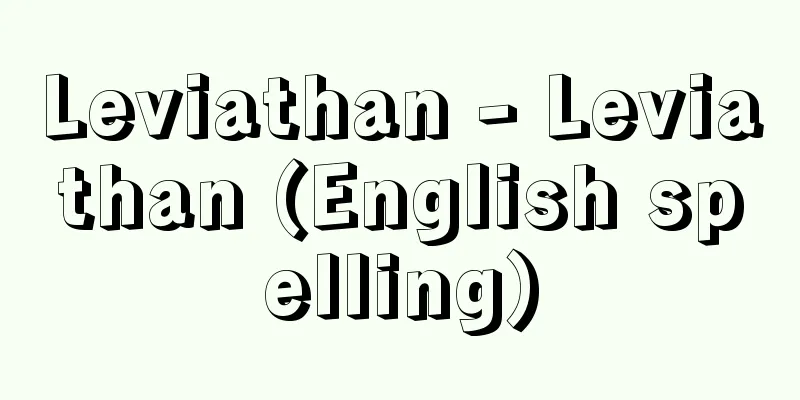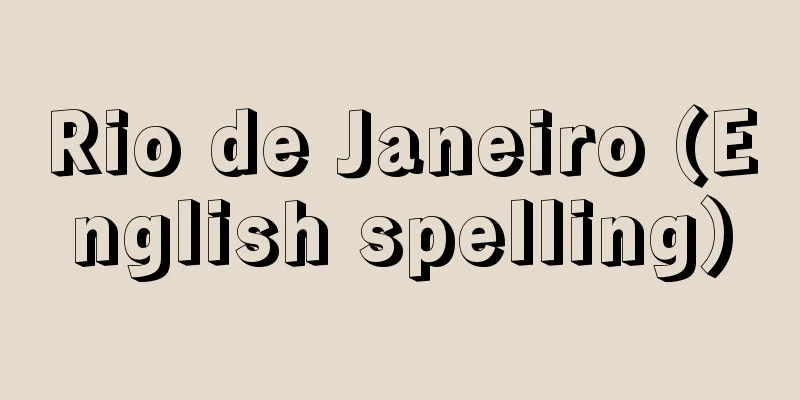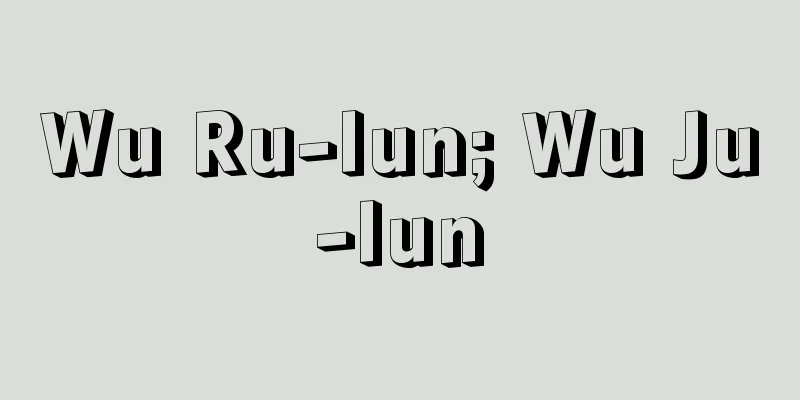Leviathan - Leviathan (English spelling)

|
The major work of 17th century British political philosopher Hobbes. Published in 1651. A great work considered to be a classic among classics of political science. Leviathan is the name of a monster that appears in the 41st chapter of the Book of Job in the Old Testament, and symbolizes the strongest thing on earth, except God. According to Hobbes, this strongest thing meant the political community that people established by contract to protect their lives, the Commonwealth (state). It should also be noted that Leviathan was a sea monster, and a peaceful monster at that. Therefore, the state is a political community created by humans through a contractual act that combines power to ensure the safety and peace of life, and therefore is stronger than groups such as royalty, churches, parliaments, and guilds. There is no doubt that Hobbes conceived and wrote Leviathan in the face of the tragic political situation of the Puritan Revolution, thinking about how to establish a peaceful and unified political society that could guarantee human life and freedom. His political theory is a secular theory of the state that is completely free from feudal class order and theological thinking. In other words, he does not look at it from the perspective of the traditional conflict between the king and parliament or the Catholic Church and the Protestant Church, but analyzes human nature in search of the highest value for humans, deriving the preservation of life (self-preservation) as the highest value, and constructing his political and social theory on that basis, thereby presenting a modern political theory that is completely different from existing political theories. In this case, he points out that in the natural state where people know nothing of law or government, they have the right to protect their own lives (natural rights), and in that sense they are free, but on the other hand, if each person in the natural state asserts their natural rights, there is a great danger of a "state of war of all against all" occurring. And in order to avoid this danger, each person must make a contract with another according to the teachings of their judgment (reason) which ultimately determines the conditions of their choice for the desire of self-preservation, establish a common authority, establish a single council (political society), unify a mere mass of people into a single person, and live peacefully according to the laws enacted by the one or council (sovereign) who represents that person. This is the idea of the "rule of law." This is the prototype of the famous modern social contract idea. Here, Hobbes states that the sovereign should be given strong power, but the reason is that power should be exercised to protect the contractual society, and he does not approve of arbitrary abuse of power like an absolute monarch. This is because he states that civil laws (laws enacted by the sovereign of each country) that go against the contents of natural law (he lists 19 laws, the first basic natural law being the maintenance of peace) are invalid. He also states that the cause of turmoil is the assertion of each party or group as the truth of their own position, and that the various Christian denominations that are fighting each other should reconcile on the one point that "Jesus is the Christ (Savior)." This is important as it states "religious freedom" and "inner freedom." In the conclusion of this book, Hobbes states that God has given natural law so that humans can live by their own efforts until the second coming of Christ, but this can be said to be an actual assertion of the modernization and secularization of political theory by teaching that humans have no choice but to live according to what he calls the principles of natural law (self-preservation). This is why his political theory became the starting point of modern democratic thought. [Hiroshi Tanaka] "Leviathan" translated by Mizuta Hiroshi and Tanaka Hiroshi (1966, Kawade Shobo Shinsha)" ▽ "The Formation of Modern Man by Mizuta Hiroshi (1954, University of Tokyo Press)" ▽ "An Introduction to the History of the Establishment of Modern Political Principles by Fukuda Kan'ichi (1971, Iwanami Shoten)" ▽ "An Introduction to the Study of Hobbes by Tanaka Hiroshi (1982, Ochanomizu Shobo)" Source: Shogakukan Encyclopedia Nipponica About Encyclopedia Nipponica Information | Legend |
|
17世紀イギリスの代表的政治哲学者ホッブズの主著。1651年刊。政治学の古典中の古典と目される大著である。リバイアサンとは、『旧約聖書』の「ヨブ記」41章に出てくる怪獣の名前で、神を除き、この地上において最強のものを象徴したことば。ホッブズによれば、この最強なるものとは、人々がその生命を守るために契約を結んで設立した政治共同体=コモンウェルス(国家)を意味した。また、このリバイアサンは海の怪獣、しかも平和の怪獣であったことに注意すべきである。したがって、国家は、人間が生命の安全と平和を確保するために力を合成する契約行為を通じてつくった政治共同体であるから、王族、教会、議会、ギルドなどの集団よりも強い、というわけである。ピューリタン革命という悲惨な政治状況を目の前にして、ホッブズが、いかにして人間の生命や自由を保障できる平和で統一的な政治社会を確立するかを考えて、『リバイアサン』を構想・執筆したことは間違いない。 彼の政治論は、封建的な身分制秩序や神学的思考からまったく解放された世俗的国家論である。すなわち彼は、従来からある国王と議会の対立とか旧教対新教の対立といった観点からではなく、人間にとっての最高価値とは何かを求めて人間の本性を分析し、そこから生命の保存(自己保存)を最高価値として導出し、それを基礎にしてその政治社会論を構築し、それによって既成の政治論とはまったく異なる近代的な政治理論を提出した。この際、彼は、法律も政府も全然知らない自然状態にあっては、人間は自分の生命を自分で守る権利(自然権)をもち、その意味では自由であるが、他方、自然状態において各人が自然権を主張すれば、「万人の万人に対する闘争状態」が発生する危険性が大であることを指摘する。そして人間がこの危険性から免れるためには、各人は自己保存の欲求のための選択の条件を最終的に決定する判断力(理性)の教えに従って相互に契約を結び、共通の権力を樹立して一つの合議体(政治社会)を設立し、単なる群衆を一人格に統一し、その人格を代表する1人または合議体(主権者)の制定する法律に従って平和に生きよ、という「法の支配」の考え方を人々に教示している。これが有名な近代的社会契約思想の原型である。 ここでホッブズは、主権者には強い力を与えよと述べているが、その理由は、契約社会を守るために権力を行使するという意味であって、絶対君主のような恣意(しい)的な権力濫用を容認したものではない。なぜなら彼は、自然法の内容(19列挙しているが、第一の基本的自然法は平和の確保)に反する市民法(各国の主権者が制定する法律)は無効である、と述べているからである。また彼は、すべての党派・集団が自己の立場を真理として主張することが騒乱の原因であるとし、とくに相争っているキリスト教各派は、「イエスはキリスト(救い主)である」という一点において和解せよ、と述べていることは、「宗教の自由」「内面の自由」を述べたものとして重要である。本書の結論部分でホッブズは、キリストが再臨するまでは、神は人間が自分たちの力で生きていくために自然法を与え給うたと述べているが、このことは、彼のいう自然法の諸原理(自己保存)に従って生きるほかないと教えることによって、実際には政治理論の近代化・世俗化を主張したものといえよう。彼の政治論が近代民主主義思想の出発点となった理由はここにある。 [田中 浩] 『水田洋・田中浩訳『リヴァイアサン』(1966・河出書房新社)』▽『水田洋著『近代人の形成』(1954・東京大学出版会)』▽『福田観一著『近代政治原理成立史序説』(1971・岩波書店)』▽『田中浩著『ホッブズ研究序説』(1982・御茶の水書房)』 出典 小学館 日本大百科全書(ニッポニカ)日本大百科全書(ニッポニカ)について 情報 | 凡例 |
Recommend
Ibn al-Rūmī (English spelling)
…Abu Nuwas was a poet of genius who was not influ...
Tohoku Expressway - Tohoku Expressway
This expressway runs north and south through the ...
Charles Messier
French astronomer. The first author of the Messie...
Chivalrous man - kyōkaku
[China] In ancient China, those who formed gangs ...
Government bonds - Koufukousai
A government bond issued by the government in lie...
National review
A type of direct democracy, generally referring t...
Croton cumingii (English spelling) Crotoncumingii
…[Nitta Aya]. . . *Some of the terminology that m...
Paralogisms
…In Aristotle, what might be called Plato's d...
Large gong - Daishouko
〘Noun〙 (also "taishouko") One of the per...
Reverse Peristalsis
...In the small and large intestines, strong peri...
Ageratum conyzoides; ageratum
An annual plant of the Asteraceae family, native t...
Commencement of war
It refers to the start of a war. Under internatio...
Charge transfer complex
They are also called molecular complexes. In addi...
Kumano [town] - Kumano
A town in Aki District, southern Hiroshima Prefect...
Gakanji Temple
This temple was built in Changgan, south of the ca...









